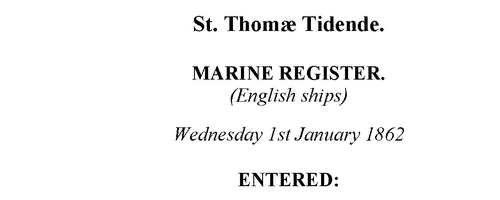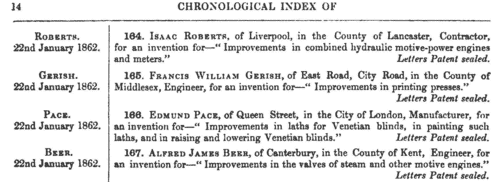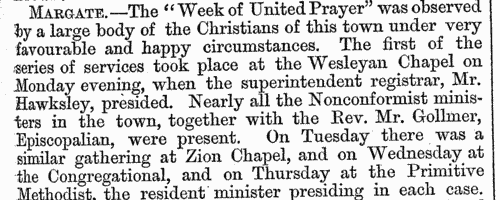Add this eBook to your basket to receive access to all 107 records. Our indexes include entries for the spelling mossman. In the period you have requested, we have the following 107 records (displaying 51 to 60): These sample scans are from the original record. You will get scans of the full pages or articles where the surname you searched for has been found. Your web browser may prevent the sample windows from opening; in this case please change your browser settings to allow pop-up windows from this site. Bankrupts' Assignments
(1858)
Assignments of bankrupts' estates (usually to principal creditors and/or close relatives of the bankrupt) in England and Wales | Sample scan, click to enlarge

| Newcastle-upon-Tyne Voters: Householders in St John's parish
(1859)
In the general election of April 1859 the candidates for Newcastle-upon-Tyne the candidates were Thomas Emerson Headlam (H), George Ridley (R) and P. A. Taylor (T); the following June a poll was held to choose the Judge-Advocate General, the candidates being the Right Hon. T. E. Headlam (H) and William Cuthbert (C). This poll book lists all the voters, giving full name and address, and votes cast. The book is divided into two sections: freemen and householders. Within the householder section the names are arranged by parish or township: All Saints, Byker, Elswick, Heaton, Jesmond, St Andrew, St John, St Nicholas, and Westgate. | Sample scan, click to enlarge

| Patentees of New Inventions
(1859)
Abstracts of British patents for new inventions applied for and granted from 1 January to 31 December 1859: giving date, name and address, and short description of the invention. It is then stated whether 'Letters patent sealed' or 'Provisional protection only'. | Sample scan, click to enlarge

|  Medical men fighting in China
(1856-1860) Medical men fighting in China
(1856-1860)
The China Medal was awarded to soldiers and sailors who took part in the prosecution of the war against the Chinese from 1856 to 1860. Separate clasps were awarded for men who had been in receipt of the China Medal of 1842; for being actually present at Canton on 28 and 29 December 1857, when that city was bombarded and finally captured; for being actually engaged in the operations which ceased with the first capture of the Taku Forts, 20 May 1858, and led to the Treaty of Tientsin; for being actually present at the capture of the Taku Forts 21 August 1860; and for being actually present before Pekin the day the gate of that city was given up to the allied (British and French) army, viz. on 13 October 1860. Many members of the British Army medical staff received this medal. | Sample scan, click to enlarge

| Patentees of New Inventions
(1860)
Abstracts of British patents for new inventions applied for and granted from 1 January to 31 December 1860: giving date, name and address, and short description of the invention. It is then stated whether 'Letters patent sealed' or 'Provisional protection only'. | Sample scan, click to enlarge

| Long-stay Paupers in Workhouses: Leighton Buzzard
(1861)
This comprehensive return by the Poor Law Board for England and Wales in July 1861 revealed that of the 67,800 paupers aged 16 or over, exclusive of vagrants, then in the Board's workhouses, 14,216 (6,569 men, 7,647 women) had been inmates for a continuous period of five years and upwards. The return lists all these long-stay inmates from each of the 626 workhouses that had been existence for five years and more, giving full name; the amount of time that each had been in the workhouse (years and months); the reason assigned why the pauper in each case was unable to sustain himself or herself; and whether or not the pauper had been brought up in a district or workhouse school (very few had). The commonest reasons given for this long stay in the workhouse were: old age and infirm (3,331); infirm (2,565); idiot (1,565); weak mind (1,026); imbecile (997); and illness (493). | Sample scan, click to enlarge

| Masters of English Merchantmen at St Thomas (1862)
The custom house at St Thomas, a Danish colony in the West Indies, issued daily lists of ships entered and cleared, which were published as the Marine Register in the twice weekly polyglot newspaper St Thomae Tidende. The reports of entries give precise date of arrival, nationality, type and name of the vessel (sailing ships in italics, steamships in capitals), the captain's surname (in bold), and whence the ship had come, sometimes adding a brief note about the cargo. The lists of ships cleared for departure have similar details, but with the ship's proposed destination. St Thomas was an important harbour not only serving inter-island Caribbean trade, and trading with England and the north and south American colonies, but also as an entrepot or intermediate destination, ships leaving with goods imported from elsewhere. A large proportion of the shipping was English, virtually all the steamers flying the Red Ensign.
| Sample scan, click to enlarge

| Patentees of New Inventions
(1862)
Abstracts of British patents for new inventions applied for and granted from 1 January to 31 December 1862: giving date, name and address, and short description of the invention. It is then stated whether 'Letters patent sealed' or 'Provisional protection only'. | Sample scan, click to enlarge

|  Men of the 1st Waikato Regiment who served in the New Zealand War
(1861-1870) Men of the 1st Waikato Regiment who served in the New Zealand War
(1861-1870)
New Zealand War Medal roll for members of the 1st Waikato Regiment who volunteered for service in the Imperial Commissariat Transport Corps in the New Zealand campaign 1861 to 1866: the rolls were compiled following a general order in 1869 and the medals were distributed in 1870. | Sample scan, click to enlarge

| Baptists
(1873)
The Baptist was a weekly newspaper, with some general news and political coverage, but mainly devoted to chronicling Denominational Intelligence, i. e. the doings of the Baptist churches in Britain and Ireland. January to June 1873. | Sample scan, click to enlarge

|
Research your ancestry, family history, genealogy and one-name study by direct access to original records and archives indexed by surname.
|












